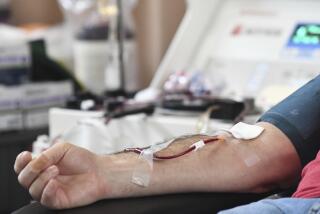Blood Screened for AIDS Infects Two Men
WASHINGTON — The first case of AIDS-contaminated blood slipping past a routine and widely used screening test was reported Thursday when government researchers announced that two men were infected while receiving transfusions of blood deemed free of the disease.
Colorado health officials were alerted last November when blood samples collected from a 31-year-old blood donor were found to contain antibodies against the AIDS virus. Blood that he had donated in April and August had been tested and found not to contain antibodies to the virus, known as HTLV-III.
Checking hospital records, officials tracked down four patients who received transfusions with blood from the man’s earlier donations and tested them for antibodies to the AIDS virus. Of the four, the two who received blood in August tested positive for the AIDS antibody, while the two who received transfusions in April were negative. None reported symptoms of the disease.
Two Homosexual Encounters
The donor told officials he had had only two homosexual encounters, one in 1974 and the other in May, 1985. The AIDS virus is sometimes transferred during homosexual encounters, and officials speculated that he became infected in the second encounter but had not produced antibodies against the virus when he donated blood in August.
Researchers have long been aware that a “window” of two weeks to six months exists between exposure to the virus for acquired immune deficiency syndrome and the development of antibodies. In addition, a small number of persons never develop the antibodies but remain active carriers of the disease.
Although health officials believe the nation’s blood supply is dramatically safer than it was before the introduction of the test for AIDS antibodies, they have acknowledged that the window has left the blood supply less than completely safe.
Married Heterosexual Infected
Of the two infected patients, one is a 60-year-old heterosexual who has been married for 30 years and denied using intravenous drugs or having extramarital affairs. Even though the other--a 57-year-old homosexual--said he has had multiple sexual partners, infection from the transfusion is “more probable,” officials said.
The cases are described in the latest Centers for Disease Control weekly report, which advises: “The current risk of transfusion-associated infection is small. Currently available screening tests detect HTLV-III/LAV antibodies in the great majority of infected persons.”
But at the same time, the report cautions that “since the antibody may not be detectable in blood from donors with very recent infections,” the safety of the blood supply requires thorough interviewing of potential donors to discourage those who are in high-risk AIDS groups--male homosexuals and intravenous drug users.
Points Out a Problem
‘This is an unusual case, but it does point out a problem that is continuing,” said Dr. Harold Jaffe, the CDC’s AIDS researcher. “If we’re talking about how we’re going to make the blood supply safer than it is now, it’s going to be through active donor deferral programs, not a new antibody test.”
Dr. Jeffrey Laurence, director of AIDS research for Cornell Medical Center in New York City, said: “Right now there is no test that will absolutely guarantee that blood is safe. The antibody tests that blood banks use are only screening tests and are not 100% foolproof. This was bound to happen sooner or later.”
Laurence said research is under way to develop a test that will detect the AIDS virus, rather than just the antibody, in blood. Other promising research, he said, includes the development of safe artificial blood substitutes and a process that uses heat to kill the AIDS virus in whole blood and platelets.
Could Donate Own Blood
Dr. Thomas Zuck, director of the Food and Drug Administration’s Division of Blood and Blood Products, suggested that patients who anticipate surgery could donate their own blood for later transfusions.
“We realize that this method is not available to the emergency patient,” he said, “but it is certainly useful and safe for the individual who knows surgery is coming.”
Dr. Neil Schramm, chairman of the Los Angeles City/County AIDS Task Force predicted that the discovery that AIDS had been transmitted through the blood supply “will continue to remind us that we are nowhere near a solution to solving the problem of AIDS. Everything that can be done is being done, but there will be more of these cases in the future.”
More to Read
Sign up for Essential California
The most important California stories and recommendations in your inbox every morning.
You may occasionally receive promotional content from the Los Angeles Times.










